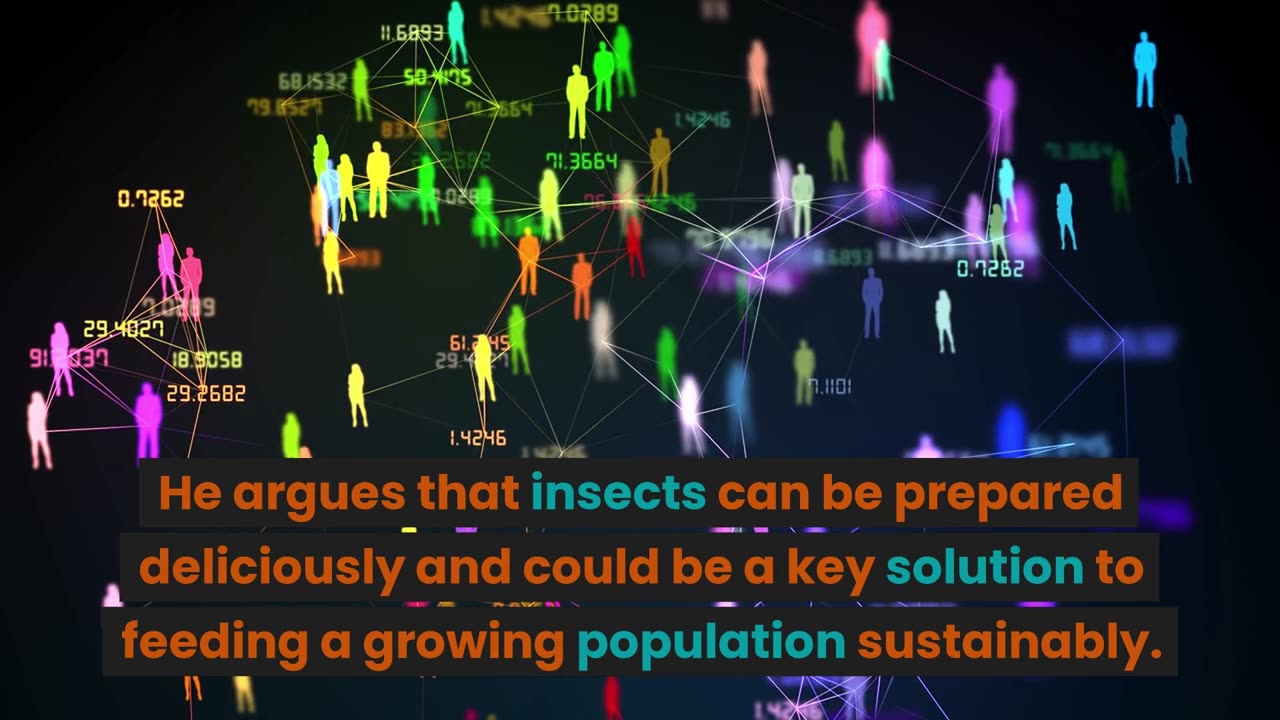Premium Only Content

"Are Bugs the Future of Food or a Sinister Plan to Control the Global Population?"
As we continue to search for ways to combat climate change, one trend that has emerged among world leaders, celebrities, and influencers is the consumption of bugs. Advocates of this trend argue that insects provide a sustainable protein source that can help address the global food crisis. However, not everyone is on board with this idea. According to Dutch political activist Eva Vlaardingerbroek, the push for insect eating is more sinister than an alternative protein source.
Vlaardingerbroek argues that the increasing popularity of bugs as a food source is part of a larger plan by politicians to control the food supply and therefore the population. She warns that if we continue to adopt insects into our food system, it could lead to actual starvation, as farmers may be forced to shift their focus away from traditional farming practices.
Despite these concerns, global leaders continue to champion the idea of incorporating bugs into our diet as a means of addressing the climate crisis. Professor Arnold Van Huis at Wageningen University argues that it is "absolutely necessary" to adopt bugs into the food system, and many celebrities and influencers have jumped on the bandwagon, touting the nutritional benefits and culinary possibilities of creepy crawlers.
Chef Joseph Yoon is an Edible Foods Ambassador for Brooklyn Bugs and works to create recipes that highlight the sustainability and nutritional benefits of bugs. He argues that insects can be prepared deliciously and could be a key solution to feeding a growing population sustainably.
However, as Tucker Carlson explores in his documentary, "Let Them Eat Bugs," there are also concerns about the politics behind the push for insect consumption. Vlaardingerbroek argues that nobody is being asked if they want to eat bugs, and the transformation of our food system away from traditional farming practices could have negative ramifications for farmers.
Furthermore, some worry that the push for insect consumption is simply another way for global elites to control the population. Dutch politician Wybren Van Haga argues that the fear surrounding climate change is being used as a way to manipulate people and gain more control over their lives. Subscribe for more content like this.
So, while bugs may offer a sustainable protein source that could help address the global food crisis and combat climate change, it is important to consider the potential consequences of incorporating insects into our diet. We must ask ourselves whether the push for insect consumption is simply a fad diet or if there is a larger agenda at play.
The push for insect consumption has been gaining momentum in recent years, with global leaders and celebrities alike advocating for its benefits as an alternative protein source and a solution to climate change. However, not everyone is convinced of its merits. Some political activists warn that the trend is more sinister than meets the eye. Dutch activist Eva Vlaardingerbroek argues that the push for insect eating is simply a compliance test, as politicians seek to control the food supply and, in turn, the people.
As the second-largest exporter of agricultural products in the world, the Netherlands' shift towards insect farming could have far-reaching implications for the global food supply. The country's farmers have expressed concerns about potential starvation if they are not careful, and massive protests have erupted in response to the government's crackdown on traditional farming practices. Despite the potential challenges, some experts argue that incorporating insects into the food system is absolutely necessary to combat the climate crisis.
Celebrities and culinary experts have also jumped on the bandwagon, with chefs like Joseph Yoon creating recipes featuring insects as a sustainable and nutritious protein source. While some may find the idea of eating bugs unappetizing, Yoon argues that bugs can be prepared absolutely deliciously, and that sustainable forms of protein are necessary to feed the growing population around the world.
However, not everyone is convinced. Political leaders like Wybren Van Haga caution that the push for insect consumption is just another method for global elites to control the population through fear. As the public is urged to be fearful and scared of climate change, COVID, nitrogen, carbon dioxide, and Putin, those in power are free to do whatever they want.
The question remains: is the push for insect consumption just another fad diet, or is there an alternative agenda at play? The answer may not be so simple. While insects may offer a sustainable protein source, the politics behind their adoption into the food system cannot be ignored. As the world continues to grapple with issues of climate change and food security, it is crucial that we consider all aspects of the push for insect consumption, from its potential benefits to its potential pitfalls.
In conclusion, the growing trend of eating bugs has been championed by global leaders, celebrities, and influencers as a solution to combat climate change. While bugs may be a nutritious and sustainable protein source, there are concerns that the politics behind the insects could have negative ramifications on farmers and the global population as a whole. Dutch political activist Eva Vlaardingerbroek warns that the push for insect eating may be a compliance test by politicians to control the food supply, leading to potential starvation if not careful. Furthermore, there are fears that global elites may be using the bug industry and climate change as a method of controlling the global population. As with any trend, it's important to consider the potential consequences and motives behind it. Ultimately, it is up to individuals to make informed choices about their diets and the impact it may have on themselves and the world around them.
As with any trend, it is difficult to predict the long-term future of insect-based food. However, it is clear that insects have the potential to play a significant role in addressing the issues of climate change and food security. As the world's population continues to grow and resources become increasingly scarce, it is likely that alternative protein sources like insects will become more prevalent.
However, the adoption of insect-based food may not be without its challenges. While some people may embrace the idea of eating bugs, others may find it unappealing or even repulsive. Additionally, there may be concerns about the safety and regulation of insect-based food products.
Overall, it is likely that the trend of eating insects will continue to grow, but the pace of adoption may vary depending on cultural, economic, and regulatory factors. It will be interesting to see how this trend develops in the coming years and how it ultimately impacts the global food system. Thanks for watching, subscribe our channel for authenticity.
-
 2:57:09
2:57:09
TimcastIRL
6 hours agoCorporate Press Refuses To Mention Minneapolis Shooter Was Trans | Timcast IRL
181K93 -
 LIVE
LIVE
Akademiks
5 hours agoWar in RAT-LANTA. Young Thug vs Gunna vs Ralo vs YSL MONDO. Who Will Le Bebe Pick. FINAL CRASHOUT!
1,690 watching -
 1:02:24
1:02:24
Man in America
9 hours agoThe Final Battle: Nanotech, Transhumanism & the War for Your Soul w/ Dr. Ed Group
39.3K3 -
 39:56
39:56
Sarah Westall
3 hours agoUpcoming World Wide Economic Collapse/Deep Recession & What the Big Money is Doing w/ Ed Dowd
33.4K4 -
 2:52:55
2:52:55
Barry Cunningham
4 hours agoIT'S MOVIE NIGHT WITH BARRY!
43.3K24 -
 31:05
31:05
The Why Files
2 days agoPeru's Most Terrifying Mystery | The Face Peelers
47.2K41 -
 1:32
1:32
Gaming on Rumble
12 hours agoWhat is the Rumble Creator Program?!?! | Lvl UP
36.6K4 -
 1:50:49
1:50:49
Flyover Conservatives
1 day ago9/11 on Steroids: What’s Coming This Fall? - Bo Polny | FOC Show
47.2K7 -
 1:01:28
1:01:28
Precision Rifle Network
10 hours agoS4E27 Guns & Grub - Let's Talk About Gas Guns
25.5K2 -
 59:29
59:29
The Charlie Kirk Show
6 hours agoTHOUGHTCRIME Ep. 96 — The Great Flag Burning Debate
52.3K35